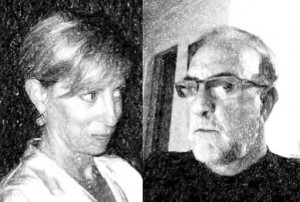The Great Twitter Debate: She Said, He Said
 My co-author Andrea Howe (@andreaphowe) and I (@charleshgreen) are both on Twitter. We have rather different ideas about it, however. We talked about our differing perspectives the other day, and decided to share our thoughts. What’s your view?
My co-author Andrea Howe (@andreaphowe) and I (@charleshgreen) are both on Twitter. We have rather different ideas about it, however. We talked about our differing perspectives the other day, and decided to share our thoughts. What’s your view?
May I Have Your Attention Please
Andrea: I have a lot of mixed feelings about Twitter. In a world marked these days by a lot of distractions, Twitter is a big one—one more thing that helps shorten my attention span. This troubles me because being focused, present, paying attention—not being distracted—are the thrust of what you and I both teach and talk about.
Charlie: Well, if you’re going to tend bar, you’d better make sure your drinking problem is under control. Twitter is indeed mostly about short attention span. Then again, so are racquetball and improv comedy. Each of them is about impressions, reacting in the moment.
Twitter is where you come to scan, not to find soul mates. There is a time and a place for everything.
Andrea: You know I don’t visit bars much. I do have a soft spot for improv comedy, though. Good point.
Popularity Contest or Personal Growth?
Andrea: As much as I like to think of myself as a somewhat-enlightened grown up, I just can’t seem to avoid the negative emotional component of the Twittersphere. Twitter takes me back to junior high school popularity contests. Sometimes I feel great, like “I’m popular, wow.” Other times, it’s depressing as hell—“Why’d I lose 5 followers today? What did I do wrong?” (laughing).
Charlie: You can take the kid out of the junior high school; the important thing is to take the junior high school out of the kid. I actually see Twitter as a personal growth tool. It forces you to recognize that not every 140-second ADD burst from a stranger is an attack upon your being. It really doesn’t mean much at all.
Andrea: You know I’m a sucker for personal growth. I’m just not sure Twitter is where I want to work this stuff out.
The Downside of Early Adoption
Andrea: As long as I’m listing my complaints, let me add this one: Doing it well requires way too many steps. There’s using different client software programs, mastering Twitter etiquette, making the effort to acknowledge followers appropriately. It can take a lot of steps to create a good Tweet. So much for scanning and reacting in the moment. I’d rather let the process work itself out. Call me (Tweet me?) when the tools are better. I’m not an early adopter; I’m here purely under protest.
Charlie: On this we can agree. Twitter is still immature, and while it is changing—every month something gets easier—it’s still too cumbersome. I want more integration, more platforms, more easily available stats, and so forth.
You don’t want to be an early adopter? I don’t blame you a bit. I am an early adopter myself, but you do a pay a price for the privilege.
Authentically Pre-Scheduled
Andrea: Let’s talk about scheduling tweets. It smacks of being strategic rather than authentic; it doesn’t feel real. If this is such a conversational tool, then why pretend otherwise by pre-writing and then auto-delivering?
Charlie: I think you’re confusing “authentic” with “real-time.” Chat rooms and IRC have been around for decades. Authentic to me means real, not necessarily ‘right now.’ I have no desire to hang around for an hour watching the feed until someone looks me up and replies. I’ve got better things to do.
Also, not everybody reads when I want to write—that’s the great thing about time-shifting technologies. By spreading tweets around, I get to more people, and more people get to me.
Andrea: Hmmm. Interesting point about “authentic” versus “real-time.” I’m going to have to think about that one.
The Big Cocktail Party
Andrea: Maybe what irks me most is that the nature of Twitter tends toward superficial interactions. While there is some substantive stuff getting exchanged out there, a lot of Twitter seems more like idle party chit chat than real connection. And I have never been a big fan of cocktail parties.
Charlie: Remember that song, “Lookin’ for Love in All the Wrong Places?” Of course Twitter is chit chat, of course it’s a big cocktail party. Why do you think they call it Twitter?
Seriously, there’s a place for shallow, and a place for deep. Twitter is shallow; blogs are deeper. Articles are deeper yet. Or books—books are real deep.
But if you want to do a surface scan on what tons of people are thinking or saying about a particular topic—hey, God bless Twitter. And compared to real cocktail parties, at least you don’t have to drink or worry about how you look.
Hello, World
Andrea: Despite all my complaints, I do tweet. And I do see one very powerful thing about Twitter: it connects people who otherwise might not be connected. It lets people share perspectives and interesting pieces of information. Link-shortening is a blessing.
Charlie: Amen to that. Twitter is the new blog comments. Twitter is the new RSS feed (though we both use Feedly and I use AllTop to source some material). It is a whole ‘nother level of content-sharing between article/blog headlines and the articles themselves—and it lets you express your own views along the way.
Twitter lets me efficiently state to the world who I am, by way of sharing what I read and my take on it. You could call that branding.
Also, contrary to all the cocktail party metaphors, I’ve met some really cool people through Twitter–and then I’ve gotten more acquainted with many of them through email, by phone, and in-person. It is a fine way to meet interesting folks relevant to one’s business.
Parlez-vous?
Andrea: One last thing. I wish I didn’t have to invest the time to learn a whole new language with Twitter: “RT,” “TY,” the myriad other abbreviations, and the effort it takes to say something sensible in 140 characters. We humans can barely communicate well in our native tongue. Isn’t our time better spent trying to master our own language?
Charlie: That’s what I keep saying to the French when I visit Paris! But I haven’t been able to convince them yet to speak English.
Andrea: Tell me you did not just try to compare Twitter to Paris.
What’s your perspective? Join the conversation. Post a comment to this blog. Tweet about it. Email us. Or—gasp—give us a call.

 I’m an enthusiastic user of many social media. I welcome interaction on Twitter (
I’m an enthusiastic user of many social media. I welcome interaction on Twitter ( If a butterfly flaps its wings in Hong Kong, will there be a monsoon in Hawaii?
If a butterfly flaps its wings in Hong Kong, will there be a monsoon in Hawaii?